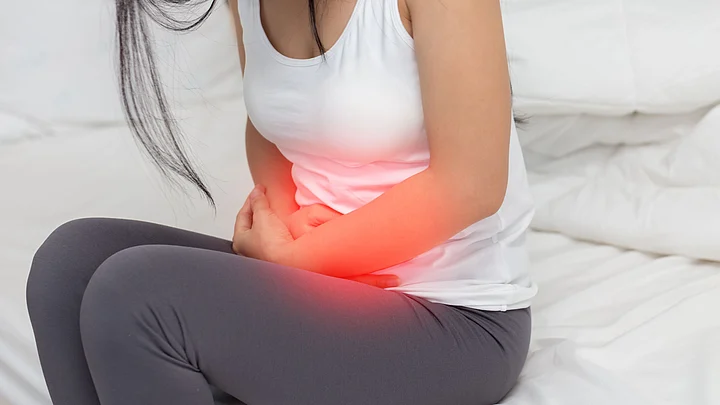Rewa Nahata was experiencing extreme hair loss for many months.
She browsed the Internet and tried some remedies, but nothing worked.
She visited her doctor and was diagnosed with Polycystic Ovary Disorder or PCOD as commonly known.
According to Sanyukta Kanwal , Statista’s research expert results of a large-scale survey conducted across India in 2020 reveal that about 16 percent of women respondents between the ages of 20 and 29 years suffered from polycystic ovary syndrome.
Symptoms and Causes
The common symptoms of PCOD may include irregular periods or no periods, inability to conceive, excessive hair growth (hirsutism) on the face, back, and buttocks, thinning of hair on the head and skin issues like acne, excessively oily skin, pigmentation of skin around the neck region and headaches.
However, it is not necessary for a patient to experience all these symptoms. She can have only one or a few symptoms.
The best course of action is to consult the doctor and get it treated.
Because if the condition is left untreated it can result in serious complications like early onset of type 2 diabetes, high blood pressure, increased cholesterol and more.
What Is The Difference Between PCOD and PCOS?
Many times, PCOD and PCOS are thought to be the same, but they are different.
Every woman has two ovaries that release one egg alternatively, every month. In PCOD the ovaries release a lot of immature or partially-mature eggs which eventually transform into cysts.
In PCOS (Polycystic Ovary Syndrome), the ovaries produce higher levels of androgen than normal which interferes with the development and release of the eggs.
As a result, some eggs develop into cysts and instead of being released during ovulation, they build up in the ovaries and sometimes get enlarged.
PCOS is a serious condition. It is a metabolic disorder. PCOD is not considered to be a disease and correct diet and exercise can help to manage it.
The exact cause of PCOD is unknown. However, some factors responsible for creating this condition are excess insulin, low-grade inflammation, excessive production of male hormones and also genetics.
Other factors may include early onset of menarche, consumption of junk food, unhealthy lifestyle pollution and environmental factors.
How Does Ayurveda View PCOD?
Ayurveda says PCOD is an improper diet and lifestyle Condition.
According to Ayurveda expert and co-founder of Ayushakti Dr Smita Pankaj Naram It occurs due to Apana Vata imbalance, opulence Kapha and toxic mucus of ama produce.
Low Metabolic fire Imbalance in Hypothalamic- Pituitary – Ovarian Axis, Hormonal Imbalance mainly Androgen, FSH, LH & Insulin level occurs during it. It also intercepts and Swells the Artava vaha channel. Women with PCOS may have ragged or prolonged menstrual periods.
Ayurvedic Diet and Treatment
"According to Ayurveda a wrong diet and lifestyle problems vitiate Tridoshas, mainly Vata (Apan Vayu) causing low circulation and low metabolic fire", explains Dr Naram.
These changes in the Artavavaha channels (Reproductive system) give rise to Imbalance in the Hypothalamic- Pituitary – Ovarian Axis and Hormonal Imbalance, she elaborates.
Consulting an Ayurvedic doctor is crucial to get the correct diagnosis and treatment that focuses on rectifying Apan Vata, improving metabolic fire and reducing inflammation and Ama toxins.
The program also includes a customized diet, lifestyle, effective herbal supplements, proven kitchen formulas, and ancient authentic detox cleansing therapies, Dr Naram shares.
The following is one of the most proven and powerful home remedies to relieve PCOD/PCOS is the below concoction shared by Dr Naram.
Ingredients
1 tsp Liquorice (Yashtimadhu)
1 tsp Cumin (Jeera)
¼ tsp Dill seed (Ajwain)
1 pinch Asafoetida (Hing)
½ tsp Black salt
½ tsp Fennel (sauf)
½ tsp Saracaindia (Ashok)
Mix all the above ingredients in half a glass of water and drink three times a day.
Tips for Prevention
Plan a diet to include 60 percent of vegetables and 30 percent protein
Include spinach and other leafy greens
Include beans, peas, peanuts, fish, and chicken
Include oats, brown rice, whole wheat, and quinoa
Avoid wheat, dairy, sour, and fermented food.
Avoid sugary foods like cakes and desserts,
Avoid fatty foods like pork and beef and fried and spicy foods
Avoid refined foods like polished rice and refined flour.
Avoid alcohol, soda and caffeinated beverages
Restrict the consumption of sodium and animal proteins
If you are experiencing any of these symptoms, please consult a doctor and then decide the line of treat. If you choose on the Ayurvedic course of treatment consult a qualified Ayurvedic doctor.
As Dr Naram rightly says, “Each body has a different way of being treated. It is important to follow medications and treatment under expert guidance to avoid complications at a later stage”.
(Nupur Roopa is a freelance writer and a life coach for mothers. She writes articles on environment, food, history, parenting, and travel.)
(At The Quint, we question everything. Play an active role in shaping our journalism by becoming a member today.)
